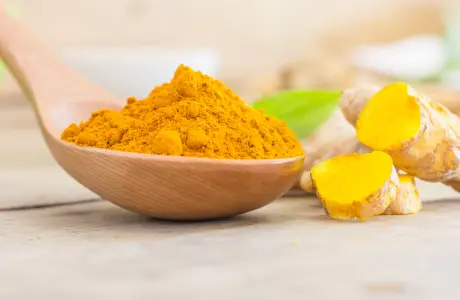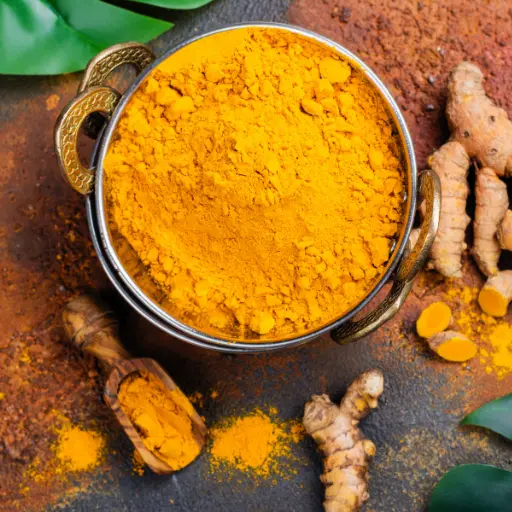Turmeric Health Benefits
Zplux Technologies2024-12-26T22:53:44+00:00Explore Turmeric
Turmeric Health Benefits

Best way to use Turmeric
Turmeric is available in a variety of forms, making it easy to incorporate into your routine in a way that works for you. Below, we’ll explore the different types of Turmeric products, recommended dosages, and tips for maximizing their benefits.
Your Guide to Harnessing Turmeric’s Power
Discover the best ways to incorporate Turmeric into your daily routine. From capsules and teas to golden milk and fresh root, learn how to maximize its benefits for your health and wellness.
Turmeric Tincture
Turmeric tinctures are liquid extracts typically dissolved in alcohol. They can be added to juices, tea, or smoothies. The standard dosage is around 10 drops, taken up to three times a day. However, tinctures can vary greatly in quality, and not all are rigorously tested for safety or efficacy. If you choose a tincture, start with a low dose and gradually increase it to avoid side effects like stomach discomfort.
We’ll cover that, too.
Turmeric: The Timeless Miracle Root for Health and Wellness
It feels like every week a new “miracle remedy” steals the spotlight—whether it’s Acai berries, coffee, Brazil nuts, or some trendy supplement backed by a hefty marketing campaign. However, these fads rarely maintain their prominence for long, especially in the age of the internet, where something new is always trending. Yet, one natural remedy has stood the test of time, remaining a staple for hundreds of years: Turmeric and its active compound, curcumin. Long before the internet or modern medicine, this humble root was widely traded across Eastern countries, originating in Southeast Asia and India. Recognizable for its vibrant yellow color and distinct spicy flavor, turmeric is much more than a culinary spice—it is a powerhouse of health benefits. For centuries, cultures that incorporated turmeric into their diets observed improved overall health and resilience against diseases. Revered in traditional medicine, turmeric was often called the “Spice of Life” or a “Miracle Root” by ancient healers in India and Asia. Their claims about turmeric’s ability to alleviate joint pain, support heart health, boost cognitive function, and strengthen the immune system have piqued the interest of modern Western scientists, validating what traditional healers have known for generations.
Turmeric has been the focus of extensive research, uncovering its remarkable health benefits. Studies show that turmeric offers superior arthritis pain relief, reduces inflammation, limits the absorption of heavy metals by the brain, and even provides anti-cancer and neuroprotective properties. That’s an impressive list for such a humble root. It’s time to reimagine turmeric as more than just a flavorful addition to curry dishes. According to hundreds of peer-reviewed medical studies, this golden spice delivers a wide range of surprising health benefits—far beyond the few mentioned here. Even more compelling, turmeric has been shown to be as effective, if not more so, than some pharmaceutical drugs, but without the unpleasant side effects. If you’re curious to dive deeper into turmeric’s uses, history, and benefits, check out our World of Turmeric page for comprehensive insights into this extraordinary root. In this ultimate guide to turmeric’s health benefits, we’ll explore the science-backed ways turmeric can support and heal the body. By the time you finish reading, you’ll have the information you need to decide if turmeric is the natural supplement you’ve been searching for or just another overhyped holistic remedy. (Hint: Science confirms it truly delivers!)
Powerful Health Benefits: Turmeric provides arthritis pain relief, reduces inflammation, protects the brain from heavy metals, and offers anti-cancer and neuroprotective properties.
Scientifically Backed: Studies show turmeric can be as effective as pharmaceutical drugs, delivering benefits without harmful side effects.
A Natural Remedy Worth Exploring: With a rich history and proven results, turmeric offers a holistic approach to health and wellness that goes beyond its culinary appeal.
Understanding Key Terms
Here’s a quick breakdown of essential terms you’ll encounter throughout this article:
Turmeric
The primary spice in curry, turmeric is a humble root from the Ginger (Zingiberaceae) family and one of the most powerful herbs on Earth. Renowned for its healing properties, turmeric has been extensively researched, with countless published studies highlighting its role in combating various diseases.
Curcumin
A bioactive compound found in turmeric, curcumin is part of a group called curcuminoids. This compound is responsible for many of turmeric’s health benefits. Since turmeric root contains only 2-5% curcuminoids, it’s more effective to use a standardized curcumin extract instead of turmeric root powder.
Black Pepper
Black pepper plays a crucial role in enhancing curcumin’s bioavailability, as the body naturally absorbs curcumin poorly. Besides being a powerful antioxidant, black pepper offers complementary health benefits when paired with curcumin.
Piperine
Piperine is the active compound in black pepper that boosts curcumin absorption by an astounding 2,000%. It is commonly included in supplements as Bioperine® to maximize curcumin’s effectiveness, such as in Me First Living’s Premium Turmeric Curcumin Supplement.

Choosing the Right Turmeric Supplement
Before diving into the benefits of turmeric, it’s important to address a common concern: how do you choose a product that truly works? With so many options available, it can be challenging to separate high-quality supplements from those that fall short. Unfortunately, some companies prioritize profits over your health, cutting corners or misleading customers about their products.
Many brands sell proprietary blends or fail to disclose the full truth about their ingredients. These proprietary blends often combine minimal amounts of active supplements with fillers like cellulose or root powder, leaving you with a product that delivers little of the benefits you’re seeking. Shockingly, these blends are popular, with store shelves often restocked daily due to high demand.
What to Look For in a Turmeric Supplement
Avoid Proprietary Blends: Proprietary blends are often marked on labels and contain small amounts of the active ingredient mixed with fillers. Always check the label for transparency.
Seek a Certificate of Analysis (COA): A COA ensures the supplement has been independently lab-tested and certified. Manufacturers must send samples of each batch to a lab for testing, where they are either approved for sale or rejected. This certification guarantees that the product is high-quality and accurately labeled.
Key Ingredients: Ensure your turmeric supplement contains standardized curcumin extract and black pepper extract (often listed as Bioperine®) for optimal absorption.
Top Ten Benefits of Turmeric Curcumin Extract
As turmeric gains popularity in the Western world, extensive research has validated its remarkable health benefits. This vibrant orange root, often used in powdered form, has demonstrated antifungal, antibacterial, and even anticarcinogenic properties, among many others. In today’s fast-paced world, finding accurate information about health supplements can be overwhelming. With endless claims and remedies, it’s hard to determine what’s truly effective. Many people are dissatisfied with conventional pain medications or struggle with the soaring costs of prescriptions. If you’ve tried other treatments with little success, turmeric may offer the solution you’ve been seeking. Why Consider Turmeric Curcumin? If you’re in search of a natural health supplement or an alternative treatment for ailments like arthritis and joint pain, turmeric is backed by science as an effective option. Its active compound, curcumin, delivers a host of proven benefits. In previous discussions, we’ve highlighted the distinctions between turmeric and curcumin and cautioned against proprietary blends. Now, let’s dive into the core question: What Can Curcumin Do for You? Adding curcumin to your daily routine can unlock significant health benefits. Here’s what you need to know about the top advantages of curcumin supplements. Stay tuned as we uncover the most compelling reasons to make turmeric curcumin a part of your wellness journey!
1) Turmeric’s Anti-Inflammatory Power: Reducing Pain and Disease
Whether you’re dealing with osteoarthritis, rheumatoid arthritis, or general joint pain, turmeric has proven to be a game-changer for many individuals seeking relief from chronic discomfort. Its active compound, curcumin, offers a range of health benefits that extend beyond pain management. The Dual Nature of Inflammation: Inflammation serves a critical role in the body’s defense system, helping fight off bacteria, illnesses, and viruses. However, chronic or uncontrolled inflammation can lead to debilitating pain and is a root cause of many Western ailments, including joint pain and arthritis. These conditions are often triggered by injuries that worsen over time or by natural wear and tear, with symptoms sometimes appearing just weeks after an injury. Turmeric’s Role in Inflammation Reduction: Curcumin, the active ingredient in turmeric, has been shown to reduce inflammation at the molecular level, rivaling the effectiveness of prescription drugs but without their harmful side effects. By inhibiting the activity of inflammatory molecules, curcumin addresses the root cause of pain and swelling, offering natural relief for conditions such as:
Arthritis: Curcumin has been found to provide greater benefits than Diclofenac sodium, a commonly prescribed drug for rheumatoid arthritis, without the associated risks.
Chronic Joint Pain: Regular use of turmeric supplements has eased pain and inflammation in both osteoarthritis and rheumatoid arthritis sufferers, according to studies published in journals like the International Journal of Biochemistry and Cell Biology.
Inflammation-Related Diseases: Chronic inflammation is believed to contribute to serious diseases like cancer, heart disease, and Alzheimer’s. Turmeric’s ability to lower inflammation offers potential preventive and therapeutic benefits for these conditions.

Research Highlights
A 2006 study in the American Chemical Society’s Journal of Natural Products confirmed curcumin’s ability to help treat or prevent rheumatoid arthritis and osteoporosis.
Curcumin has demonstrated effectiveness comparable to NSAIDs like aspirin and ibuprofen in reducing low-level inflammation, targeting its root causes and even repairing existing inflammation damage.
Why Choose Turmeric?
If you’re tired of relying on over-the-counter medications like Tylenol, turmeric offers a healthier, natural alternative. Its anti-inflammatory properties make it an effective supplement for managing pain and reducing inflammation, supporting overall health in the process. Incorporating turmeric into your daily regimen could not only alleviate joint pain but also play a vital role in preventing the development of inflammation-driven diseases, making it an essential addition to your wellness routine.
2) Antioxidant Benefits of Turmeric: Boosting Immunity and Reducing Signs of Aging
Turmeric and its active compound, curcumin, have long been celebrated for their ability to strengthen the immune system and provide powerful antioxidant benefits. These properties not only help you stay healthy but also support recovery when you’re under the weather.

How Turmeric Supports Immunity
The antioxidant effects of turmeric extract go beyond just preventing colds; they can also speed up recovery. Many people report shorter cold durations when taking curcumin supplements or drinking warm milk mixed with turmeric powder. Curcumin’s antiviral, antioxidant, and antifungal properties make it a potent ally in bolstering your immune defenses.
The Role of Antioxidants in Health
Antioxidants are essential for protecting the body against disease and oxidative damage caused by free radicals. These free radicals can wreak havoc on your health, leading to aging, cellular damage, and a variety of diseases. Curcumin combats free radicals by: • Neutralizing Free Radicals: Its chemical structure allows curcumin to bind with free radicals, preventing oxidative damage. • Enhancing Natural Antioxidants: Curcumin boosts the body’s own antioxidant enzymes, amplifying your natural defense against oxidative stress.
Slowing Down the Signs of Aging
While aging is inevitable, curcumin can help control how early and visibly it manifests. Studies have shown that curcumin’s ability to neutralize free radicals and repair oxidative stress can: • Prevent premature aging caused by chronic stress, trauma, or poor nutrition. • Repair age-related cellular damage. • Improve skin health by reducing redness, irritation, and wrinkles.
Skin Benefits of Turmeric
Curcumin’s antioxidant and anti-inflammatory properties also extend to skincare. It can help with conditions like: • Acne and Blemishes: Curcumin’s antibacterial qualities can reduce breakouts and improve overall skin clarity. • Dryness and Redness: Its anti-inflammatory effects soothe skin irritations such as rosacea and blotchiness. • Wrinkle Reduction: Regular use of curcumin can tighten skin and minimize the appearance of fine lines. While topical applications of turmeric and curcumin are still in early stages of research, initial studies suggest promising results for alleviating skin conditions. As research advances, turmeric’s role in dermatology may become even clearer.
Combatting Premature Aging
Premature aging often results from oxidative stress caused by free radicals. Factors like poor diet, chronic stress, and environmental toxins exacerbate this damage. By incorporating turmeric into your routine, you can fight oxidative stress and maintain healthier skin and body function over time. Incorporating turmeric into your diet or skincare regimen offers a natural, holistic way to boost immunity, combat oxidative damage, and slow the visible effects of aging. With its powerful antioxidant properties, turmeric remains a timeless solution for both inner and outer health.
3) Reduce Your Risk of Alzheimer’s and Cognitive Decline
Curcumin, the active compound in turmeric, offers significant benefits for brain health. Research shows that it can improve brain function by enhancing the connections between neurons, potentially boosting memory and lowering the risk of neurodegenerative diseases like Alzheimer’s. Factors Leading to Cognitive Decline: Cognitive decline can stem from various factors, including chronic stress, aging, trauma, and a lack of mental stimulation. These factors contribute to diminished brain function and increase the risk of diseases such as Alzheimer’s and dementia.

Curcumin’s Impact on Brain Health
Daily supplementation with curcumin extract has been shown to:
Enhance Brain Function: By forming stronger neuronal connections, curcumin supports cognitive thinking and memory retention.
Boost BDNF Levels: Curcumin increases Brain-Derived Neurotrophic Factor (BDNF), a growth hormone essential for producing new neurons and preventing brain degeneration.
Combat Inflammation and Oxidative Damage: Since inflammation and oxidative stress play a key role in Alzheimer’s, curcumin’s anti-inflammatory and antioxidant properties make it a powerful preventative tool.
Reduce Amyloid Plaques: Studies suggest curcumin decreases the buildup of amyloid plaques in the brain, a hallmark of Alzheimer’s, while clearing protein tangles and other harmful buildup.
Research Highlights
The Journal of Alzheimer’s Disease reports promising findings on turmeric’s ability to support those with neurodegenerative conditions. Long-term curcumin use has been observed to repair brain connections in animal models. Additional studies show curcumin’s unique ability to cross the blood-brain barrier, a critical challenge for many supplements, enabling it to directly impact brain health.
Preventative Measures for Alzheimer’s
Alzheimer’s, a devastating form of dementia, affects millions worldwide and remains the most common neurodegenerative disease in the United States. While there is no cure, preventative strategies are crucial. Incorporating curcumin into your routine can help stifle the effects of the disease long before symptoms appear, as Alzheimer’s can begin developing in the brain decades before diagnosis.
The Path Ahead
Although much about Alzheimer’s and dementia remains unknown, ongoing research continues to reveal curcumin’s potential in combating these diseases. By addressing key factors such as inflammation, oxidative damage, and low BDNF levels, curcumin offers a natural and promising approach to reducing cognitive decline and protecting brain health. Taking proactive steps now, such as integrating curcumin into your daily regimen, can help preserve cognitive function and protect your brain for years to come.
4) Turmeric: Fighting Depression and Boosting Your Mood
In today’s fast-paced world, stress and depression have become alarmingly common. Depression rates are higher than ever, affecting people across a wide range of ages. While numerous medications are available to treat depression, many offer only temporary relief and come with undesirable side effects. Turmeric as a Natural Alternative: Curcumin, the active compound in turmeric, has shown remarkable potential in treating depression. In randomized trials comparing curcumin to leading antidepressants like Prozac, patients experienced similar improvements in mood and symptoms. This suggests that curcumin can be as effective as pharmaceutical drugs in managing depression.

How Curcumin Fights Depression
Boosting BDNF Levels: Depression is often linked to a deficiency in Brain-Derived Neurotrophic Factor (BDNF), a hormone that supports brain health. Curcumin has been proven to increase BDNF levels, helping alleviate depressive symptoms.
Enhancing Neurotransmitters: Curcumin stimulates the production of serotonin and dopamine, key neurotransmitters that regulate mood and promote feelings of happiness and well-being.
Reducing Stress: Curcumin helps regulate hormones, which can lower stress levels and, in turn, reduce the severity of depression and anxiety.
A Safer Alternative to Antidepressants
Studies suggest that curcumin not only matches the effectiveness of medications like Prozac but also provides additional benefits without the unpleasant side effects. This makes it a promising natural alternative for those seeking relief from depression and stress. Incorporating turmeric or curcumin supplements into your routine may offer a natural and effective way to boost your mood, improve brain health, and combat depression, all while avoiding the drawbacks of traditional pharmaceutical treatments.
5) Turmeric: Enhancing Mental Clarity and Combating Brain Fog
We’ve all been there—feeling stuck in a mental haze where thoughts come slower, focus is elusive, and quick decision-making feels out of reach. This frustrating experience, commonly known as brain fog, can stem from various causes such as high stress levels, trauma, or even certain medications. Thankfully, there’s a natural solution to help clear the fog. Curcumin’s Role in Boosting Cognitive Function Curcumin, the active compound in turmeric, has been shown to enhance cognitive function and support mental clarity when taken regularly. Its benefits extend to improving memory, reducing cognitive decline, and fostering long-term brain health.

The Memory-Boosting Power of Turmeric
Improved Working Memory: Studies indicate that just 1 gram of curcumin extract daily can enhance working memory over time. A 2014 study published in the Asia Pacific Journal of Clinical Nutrition found that turmeric significantly improved problem-solving, logic, and planning skills.
Prevention of Cognitive Decline: Regular use of curcumin can lower the risk of future cognitive impairment, including conditions like dementia.
Daily Routine Integration: Researchers recommend incorporating 1 gram of turmeric into your breakfast to reap its cognitive benefits.
Why Working Memory Matters
Working memory is critical for day-to-day problem-solving, logical thinking, and planning. Measuring its strength can also provide insights into an individual’s predisposition to dementia and other cognitive impairments. By adding turmeric to your daily regimen, you can improve mental clarity, sharpen your focus, and reduce the risk of long-term cognitive issues—all while benefiting from a natural and accessible remedy.
6) Turmeric and Curcumin: Potential Allies in Reducing Cancer Risk
Cancer remains one of the most devastating diseases, extensively studied by the world’s top researchers. While science continues to make breakthroughs, curcumin, the active compound in turmeric, has shown promising anti-carcinogenic properties in various studies. Although further clinical trials are needed, the current research suggests that curcumin may help inhibit the growth of cancer cells, reduce the risk of mutations, and even combat mutated cells already present in the body. Curcumin has demonstrated the ability to prevent the growth of cancer cells, halt existing tumor development, and, in some cases, destroy cancerous cells altogether. It has shown particular promise in preventing radiation-induced tumors and has been studied for its effects on cancers such as leukemia, colon cancer, and breast cancer. In addition, curcumin has been linked to inhibiting the growth of melanoma cells and killing tumor cells, as reported in a 2005 study published in CANCER, a journal by the American Cancer Society.

In 2009, research highlighted curcumin’s ability to selectively target and kill tumor cells, including those associated with HPV-induced oral and cervical cancers. Its powerful anti-inflammatory properties also play a critical role in combating metastatic tumor growth, particularly in malignant prostate and breast cancers. A 2012 study in the journal Carcinogenesis even found that curcumin could safely enhance chemoprevention protocols, making it a potential supplement in cancer prevention strategies. Curcumin appears to be most effective when used in early stages or for individuals at high risk of developing tumors. For instance, a 2017 study in Precision Oncology found that curcumin, when combined with ursolic acid from apple peels, could stop prostate cancer cells from absorbing glutamine, a vital compound for their growth. While curcumin shows great potential, it is essential to consult a healthcare professional before starting any supplement regimen. It’s also not recommended to discontinue prescribed cancer treatments in favor of curcumin without medical advice. Cancer is a complex disease that requires a comprehensive approach, so discussing all options with your doctor and reviewing relevant clinical studies is crucial for making informed decisions.
7) Turmeric: Supporting Heart Health and Reducing Cardiovascular Risks
Heart disease and cardiovascular issues are significant threats, particularly for individuals with high-risk lifestyles, poor nutrition, or genetic predispositions. As the leading cause of death in the United States and one of the top global health concerns, heart disease becomes increasingly critical to address with age. Fortunately, curcumin, the active compound in turmeric, has demonstrated remarkable cardiovascular protective qualities. By promoting heart health and reducing damage to surrounding organs and tissues, curcumin helps lower the risk of developing heart disease. Regular consumption of turmeric has been associated with decreased cardiovascular risks, thanks largely to its powerful anti-inflammatory properties.

Curcumin’s Role in Cardiovascular Health One of the key factors in heart disease is endothelial dysfunction, where the thin layer of tissue lining blood vessels—the endothelium—fails to regulate blood pressure, clotting, and other essential functions. Curcumin has been shown to improve endothelial function, often matching the effectiveness of pharmaceutical drugs specifically designed to treat this condition. In a study published in the Nutritional Research Journal, researchers examined two groups of postmenopausal women. One group supplemented with curcumin extract while the other did not. Both groups participated in aerobic exercise, and the results showed that women taking curcumin experienced significantly stronger organ tissues, including those surrounding the heart. This combination of curcumin and exercise was found to improve age-related decline in endothelial function, reinforcing heart health and resilience. A Holistic Approach to Heart Health While curcumin provides significant cardiovascular benefits, it is essential to pair supplementation with proactive lifestyle changes. Maintaining a balanced diet, managing stress, and engaging in regular physical activity remain crucial for heart health. By incorporating curcumin into your routine, you can support your heart’s health, enhance the function of its blood vessels, and take a proactive step toward reducing the risks of heart attacks and cardiovascular disease.
8) Turmeric: Supporting Diabetes Management and Blood Sugar Control
Turmeric’s benefits for diabetes, though not widely known, are both remarkable and scientifically supported. Research shows that curcumin, the active compound in turmeric, plays a significant role in managing Type II diabetes by helping the body regulate and absorb insulin levels more effectively. Additionally, curcumin has been shown to enhance the efficacy of many diabetes medications, making it a powerful complementary treatment. Curcumin has demonstrated the ability to lower blood sugar levels and reverse insulin resistance, a key factor in Type II diabetes. A notable study from Auburn University found that curcumin suppresses glucose production in the liver and is approximately 400 times more potent than Metformin, a widely prescribed diabetes drug. For individuals with Type I diabetes, curcumin offers additional benefits, including improved metabolic function and a reduction in arterial plaque build-up. These effects not only aid in better glucose control but also support cardiovascular health, which is often compromised in diabetic individuals. By incorporating turmeric into your regimen, you can leverage its natural properties to help manage blood sugar levels and support overall metabolic health.

9) Turmeric’s Antiseptic Power: Accelerating Wound Healing
Curcumin, the active compound in turmeric, possesses remarkable antiseptic properties that can expedite the healing process for wounds. While it may sound extraordinary, the science behind it reveals why curcumin is so effective. Wound healing varies from person to person, but curcumin provides a natural boost by enhancing the skin’s collagen production. Collagen is crucial for repairing broken tissue, as it strengthens the bonds between new and old skin, helping the wound contract and heal more securely. Topical applications of curcumin gel or paste have been found to be particularly effective for treating burns, scalds, and wounds. Research conducted by Dr. Madalene Heng of the David Geffen School of Medicine, published in the 2017 issue of BioDiscovery, highlights the superior benefits of applying curcumin directly to the skin compared to ingesting it in tablet form for wound care. In addition to its wound-healing abilities, curcumin’s antibacterial properties help protect wounds from infections by keeping bacteria at bay. However, it’s important to note that while curcumin can support the healing process, proper wound cleaning and modern medical practices should still be followed to ensure optimal care. By incorporating curcumin into your wound care routine, you can harness its natural antiseptic and antibacterial qualities to promote faster, more effective healing.

10) Turmeric: Boosting Metabolism and Supporting Fat Burning
Cancer remains one of the most devastating diseases, extensively studied by the world’s top researchers. While science continues to make breakthroughs, curcumin, the active compound in turmeric, has shown promising anti-carcinogenic properties in various studies. Although further clinical trials are needed, the current research suggests that curcumin may help inhibit the growth of cancer cells, reduce the risk of mutations, and even combat mutated cells already present in the body. Curcumin has demonstrated the ability to prevent the growth of cancer cells, halt existing tumor development, and, in some cases, destroy cancerous cells altogether. It has shown particular promise in preventing radiation-induced tumors and has been studied for its effects on cancers such as leukemia, colon cancer, and breast cancer. In addition, curcumin has been linked to inhibiting the growth of melanoma cells and killing tumor cells, as reported in a 2005 study published in CANCER, a journal by the American Cancer Society.

Concluding Thoughts: The Timeless Power of Turmeric
Turmeric’s potential health benefits are vast, and as research continues, we are likely to uncover even more ways this incredible spice can support wellness. For centuries, India recognized turmeric as a powerful medicine, and modern science is now validating its extensive applications. These highlights only scratch the surface of turmeric’s possibilities, but it’s important to remember that some individuals may be allergic to turmeric, particularly those with allergies to ginger or other members of the Ginger (Zingiberaceae) family. Before incorporating turmeric into your regimen—whether as a supplement or a substitute for medications—consult with your doctor. Even natural remedies like turmeric can interact with prescription or over-the-counter drugs, so professional guidance is crucial to ensure safety and effectiveness. Curious to dive deeper into the world of turmeric? Visit our World of Turmeric to explore more about this humble yet extraordinary root!
